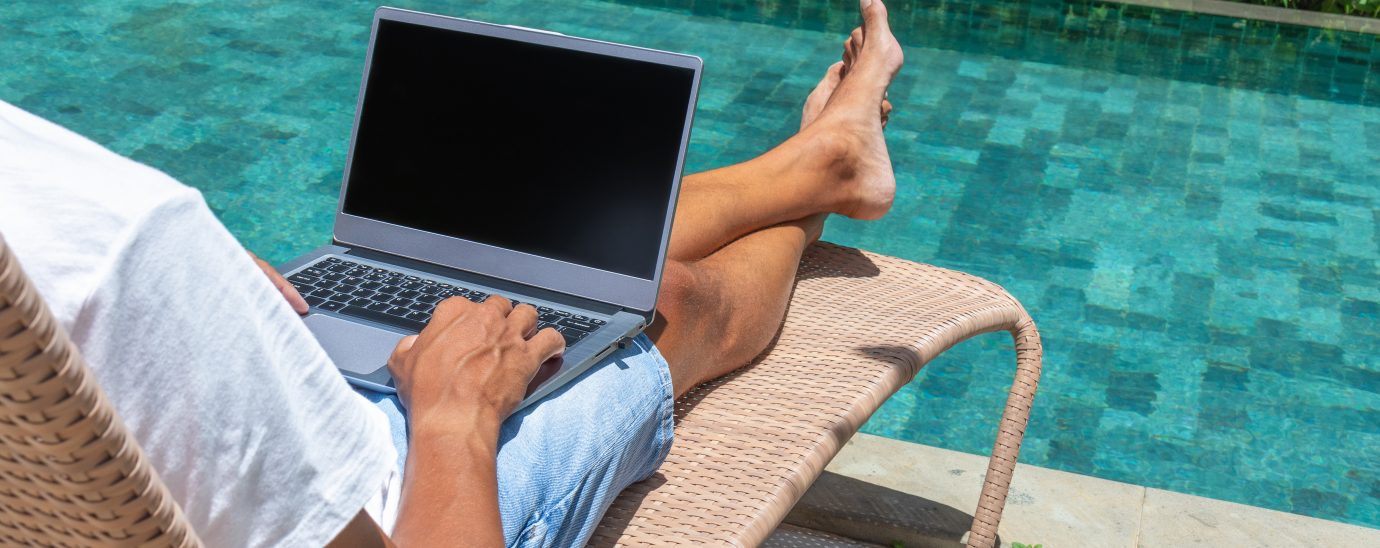The rise of the workcation and the fall of the 9 to 5

Remote working isn’t always a walk in the park, although a walk in the park can sometimes help when you need a little headspace from the old home office. Al Fox, Director at global B2B tech marketing agency, Fox Agency discusses how changes in working habits have given rise to the workcation and how this phenomenon, which may at first seem like a flight too far, brings a wealth of employee and business benefits.
In lockdown one, we realised that hybrid and remote working could work for us, so we made the decision to make it permanent. Now that we’re all open again, we’re finding that some of the team are coming to the office a few days a week, whilst others are perfectly happy staying at home. We’ve made it as efficient as possible, the financial targets are going in the right direction, and the team is happier, so we see no reason to change.
Because we also have team members who are full time remote, we knew that workcations would be an extension of that and have always been open to the idea. Our first exposure to workcations was way back in 2012 when our first designer spent parts of the year living in Barcelona and then Northern Thailand. Obviously, the six-hour time difference for the latter made things trickier for briefings during the workday, but it also meant that work could be carried out in our closed time, ready for the following morning.
We didn’t know any other companies that had this arrangement back then, but we found that it could work, and have therefore been receptive to it ever since.
Last year, our Head of New Business Development requested permission to be based in Dubai for a few months. Obviously, no one was in the office back then and in-person meetings were off the agenda, so it didn’t make a huge difference to us where he worked from. Being single with no ties made it easier for him, but for many of us, it wouldn’t be so straightforward. There is only a three-hour time difference and the obvious upside for us was that he could prospect Dubai-based businesses and further expand our global client list. He changed his work pattern to start earlier and finish later, so he could spend the middle of the day at the gym and then the beach. On rainy days in the UK, we were all green with envy.
Our CFO lives 200 miles from our head office and has therefore worked remotely since she began. Before we took her on, we knew that she’d sometimes be working from her second home in rural Italy. Importantly, her Italian home has fast internet connectivity, so we don’t find any difference in where she’s working from; we communicate via Teams and email, as well as using Basecamp, Dropbox, Google Docs, Xero and Synergist, so with everything in the cloud, it just works.
Possibly inspired by all this, two of our directors recently decamped to a pool villa in the Algarve for ten days. Their day-to-day schedules hadn’t changed, so there wasn’t much leisure time, but it did mean that they could take regular breaks to swim and sunbathe. It helped to recharge their batteries, so any business impact was all positive.
READ MORE:
- The security threat of Bring Your Own Device (BYOD) initiatives
- How CIOs can become CEOs: tips from a tech leadership headhunter
- Why More Women are Choosing STEM Careers and Stereotypes Are Being Smashed
- What’s the state of gender diversity in the tech industry?
We’re a marketing agency and we need to be around all day for our clients, so whilst we can never offer true flexitime, we can offer our team some flexibility to their working week should they need it. No doubt more will request workcations and we see no reason not to allow them. We trust people when they say that they’re going away to work, and to be honest, it would be obvious if they were treating it as a holiday. We also only employ grown-ups and we find that they all want to do their best for the team.
For more news from Top Business Tech, don’t forget to subscribe to our daily bulletin!
